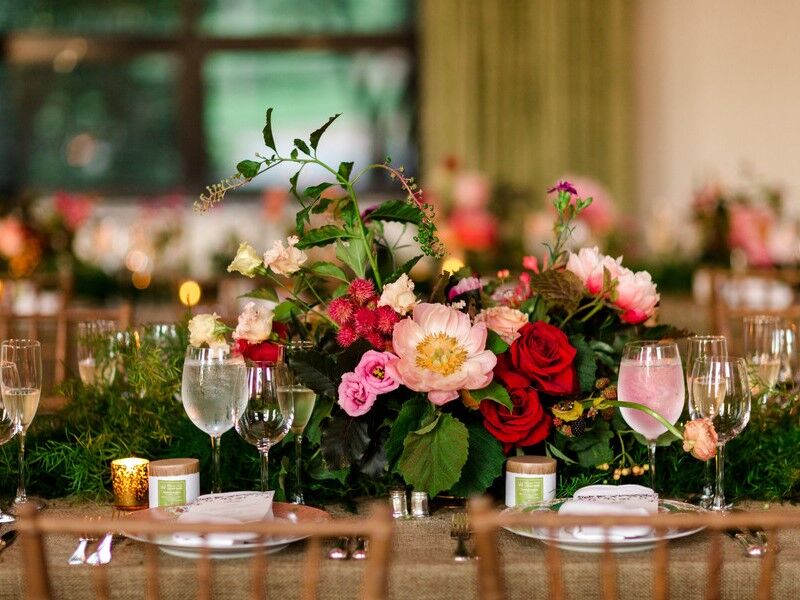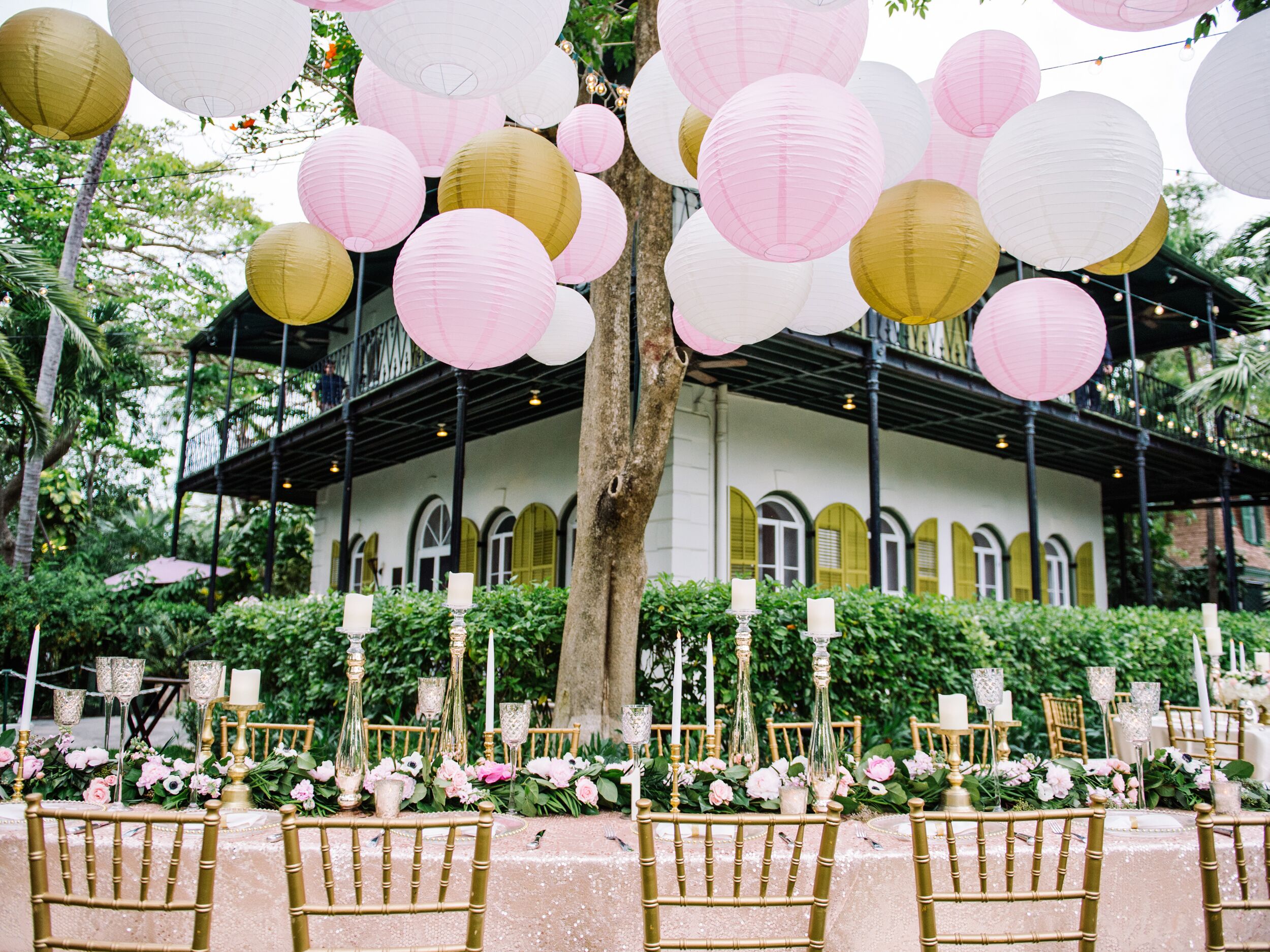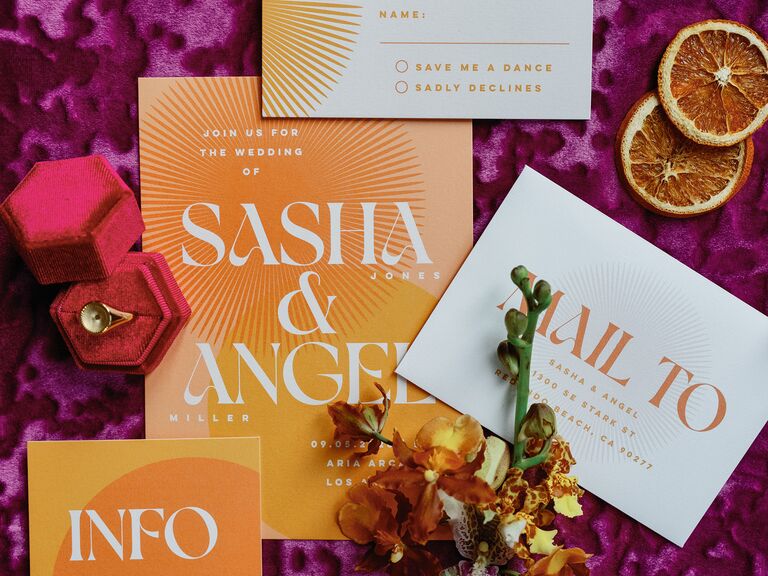24 Hidden Wedding Costs You Probably Haven't Thought Of
Having a wedding is expensive as it is, which is why it's important to prepare yourself for these inevitable fees so they don't sneak up on you and surprise you later. As you're searching for wedding vendors (The Knot Vendor Marketplace is a great place to start!), it's essential to read contracts carefully to make sure you're aware of any additional fees that can quickly add up. We're here to help—below, check out a list of common hidden wedding costs couples tend to overlook, so you can start factoring them into your budget now to avoid overspending.
1. Event Rentals
There are two different types of wedding venues—ones that include catering and other services (often called all-inclusive venues) and ones that don't. If you've selected a venue where you're just renting the space, you'll need to account for everything from tables to chairs to silverware to drinking glasses, and more.
The Cost: According to The Knot Real Weddings Study, the average couple spends $1,800 on event rentals.
How to Avoid It: Read venue contracts carefully to learn what's included. If you'd rather not hire a separate rentals company, choose a wedding venue where rentals are included.
2. Insurance
Emergencies can happen—even on your wedding day. When you purchase wedding insurance, you're covered if your venue gets damaged, someone gets injured, you have to cancel your event, or another issue arises. And what's more, some venues require you to purchase it.
The Cost: A basic insurance policy usually costs between $125 and $550.
How to Avoid It: Unless your venue or another vendor requires wedding insurance, you don't have to buy it. But skip it at your own risk.
3. Travel Fees
When wedding vendors have to travel more than a couple of miles to your wedding, they often charge a travel fee to account for the time spent traveling and fuel. Gas is expensive, y'all!
The Cost: It depends on the vendor, but some pros charge per mile, while others have a flat fee if they need to travel more than a certain distance—this can add up to several hundred dollars. If you're hiring vendors for a destination wedding, you will need to pay for their travel, accommodations and other expenses, as well.
How to Avoid It: Choose vendors who are based near your wedding venue (this is especially crucial if you're hosting a destination wedding), and ask about any travel fees up front.
4. Backyard Wedding Necessities
You might think that hosting a wedding in your own backyard is the easiest thing you can do, but it actually can get pretty complicated—and expensive. You may need to bring in tenting, generators, restrooms, even a full outdoor kitchen to avoid overuse and damage of your home—all of which can add up pretty quickly.
The Cost: Additional costs for backyard weddings can easily enter the five digit range.
How to Avoid It: Think long and hard about if a backyard wedding is right for you (and consult a wedding planner who has planned backyard weddings in your area before). If the costs seem too high, opt for a full-service wedding venue.
5. Taxes and Gratuities
Even though these aren't exactly hidden—we all know there are taxes on almost everything and gratuities are expected for almost any service—most couples don't think about how much they'll end up owing during the planning process, or how tons of vendors don't include gratuity in their pricing quote up front.
The Cost: This will depend on the total amount of money you're spending as well as the location of the event (taxes vary by state), but you should set aside at least $800 to give to your vendors for their hard work.
How to Avoid It: There's no getting around paying taxes, but paying the entire bill in one lump sum can help lower the overall price. A safe bet: Tack on an extra third of your total costs to your budget for tips and taxes.
6. Service Fees
No, these service fees aren't a tip for the event staff—but another fee that venues charge to cover their own cost of hiring servers, coat checkers, and bathroom and parking attendants. Additionally, going with an outside baker or your own wine can raise the price. Why? Because your venue's workers are responsible for slicing and serving each piece, then cleaning the dishes—and this means more work for their staff. (But know that if you use the cake or liquor provided by your reception site, the charge is usually wrapped into the cost.)
The Cost: Service charges can typically amount to 20 to 25 percent of the event's total food and drink fee. Cake-cutting can cost anywhere from $2 to $5 per guest, and a corking fee can cost anywhere from $1.50 to $3 for every bottle the staff opens.
How to Avoid It: Be up front. Ask about any service fees (like cake-cutting and corkage) before you decide to go with an outside source for either.
7. Vendor Trials
Yes, a florist or other vendor's demo may be gratis the first time, but if you make repeated changes, you definitely risk being billed. And of course, you'll want to factor in your hair and makeup trials with your stylist into your overall beauty budget.
The Cost: It depends on the total cost of your vendor and where you live.
How to Avoid It: Ask about trial fees (and additional changes) up front. If you want to avoid trial fees altogether, feel free to skip and simply describe to your vendors exactly what you want—but know you're taking a risk by doing so.
8. Cleanup and Breakdown Costs
Many couples spend so much time planning the actual day they forget to budget for what happens when it's all over.
The Cost: While a full-service venue won't charge for these things, if you're paying a flat fee to rent only the space, anticipate additional charges for garbage removal (up to $250) and cleaning (up to $500). And even most full-service venues require same-day setup and cleanup. So if you're getting married on a weekend, expect to pay time and a half for labor, and if your party goes into the wee hours of the morning, you may face extra charges for late-night pickup and cleanup.
How to Avoid It: Read your contract carefully—the setup and breakdown costs should be included in the labor charge.
9. Non-Venue-Approved Professionals
Some venues require you to use caterers or florists from their preferred pros list—and tack on a fee if you don't.
The Cost: Usually an extra 20 percent or more.
How to Avoid It: Stick to its list of preferred vendors, or choose a venue without one.
10. Rental Transport
You'd assume the rental companies would include these extra fees in the per-item costs (do they honestly think you're going to fit 150 Chiavari chairs in your car?), but surprisingly they don't.
The Cost: From $50 up to more than $500.
How to Avoid It: Ask the rental company what its shipping and packaging fees are up front—if the cost is too high for your budget, shop around a bit. You might actually save some money by renting items from a more expensive company that includes delivery costs at no extra charge.
11. Marriage License Fee
Yes, even a city hall wedding will cost you. And you might just shrug it off since it's such a small fee, but like any tiny detail (for example, the ribbons for your wedding favors), it's just one thing you'll need to factor into your budget.



The Cost: It depends where you live. In the state of New York, the marriage license fee is $35.
How to Avoid It: Unfortunately, you can't get around this one!
12. Wedding Band Equipment
The cost of the wedding band includes fees for the musicians' time and the minimum amount of equipment needed. If your reception space is extra large, additional speakers and microphones could be required to project the best sound quality.
The Cost: Anywhere from several hundred to several thousand dollars.
How to Avoid It: Before booking your wedding band or DJ, you need to clearly explain the layout of the space (or have them check it out, if they can) so the pros know exactly what they're working with. If they want to add in extra equipment, have them explain why it's necessary before signing a contract or agreeing to pay for anything else.
13. Postage Stamps
Typically couples don't factor postage into their wedding invitation budget—but depending on the shape, size and weight of your wedding invitations, stamps can add a big chunk of change to your stationery bill. For example, did you know that square-shaped envelopes cost more to send than standard rectangles?
The Cost: Oversize, uniquely shaped, heavy or bulky invitations can cost you about $2 each to mail.
How to Avoid It: Skip the fancy boxed invitations and multilayer cards, which can bulk up quickly and cost a lot more than you bargained for.
14. Undergarments
The right underpinnings can make all the difference. And because you're usually buying your undergarments separately from your wedding attire, you might not factor them into your budget.
The Cost: A simple bra and underwear can cost less than $100, whereas a full corset, bustier or bodysuit can set you back several hundred dollars.
How to Avoid It: Go commando (kidding). Undergarments aren't a huge expense in the grand scheme of things, but you might ask your alterations person if bra cups can be sewn into your dress so you don't have to buy separate undergarments.
15. Wedding Dress Alterations and Steaming
Most stores don't include alterations (or steaming) in the price of the wedding dress, and they're not doing it for free—it can take up to three hours just to alter the bustier.
The Cost: A simple hem can be less than $100, but completely rebuilding a bodice can send the price up to $500.
How to Avoid It: Ask about what the store charges for every alteration you may need before purchasing the gown so you're not blindsided by the extra costs.
16. Weather-Related Items
If you're hosting an outdoor event, your wedding-day forecast might call for some last-minute purchases, from sunscreen to umbrellas, rain boots to blankets.
The Cost: It varies widely depending on what you're purchasing, whether it's just for you and your wedding party or all of your guests.
How to Avoid It: Hosting an indoor wedding can alleviate weather-related concerns and expenses.
17. Thank-You Gifts
Yes, you'll be receiving a lot of gifts as a newly-married couple, but you'll also purchase and give quite a few gifts in the process. From wedding party members to parents to vendors, all these gifts can add up—and couples often forget to include these presents in their wedding budget.
The Cost: According to The Knot Real Weddings Study, the average couple spent $440 on wedding favors and gifts.
How to Avoid It: You can find thank-you gifts at a wide range of price points. Focus on gifts that are sentimental rather than expensive.
18. Overtime Fees
Your band, DJ, wedding photographer and videographer are booked for a certain amount of time, so if your wedding runs a little longer than you expected, they'll charge per hour after they've reached the time specified in the contract.
The Cost: Starting at $250 per hour (although some vendor's per-hour overtime fees are more expensive than their typical per-hour charge).
How to Avoid It: Factor in additional time for getting dressed and taking photos—that way, you can book your pros for a more realistic time frame. Get overtime costs in writing (they shouldn't be more than 50 percent more per hour than the regular rate), so you'll know what to expect if you decide to keep the party going.
19. Welcome Bag Delivery
Most hotels don't factor in a welcome bag delivery fee when you block rooms. And they may fail to mention the rate unless you ask—and they'll just add it to your final bill. They may even charge you a fee for holding the welcome bags if you drop them off before guests arrive, so make sure to ask.
The Cost: Up to $7 per bag.
How to Avoid It: During the booking process, ask about the hotel's policy on receiving and delivering welcome bags to guests' rooms. It may be free or cheaper if they hand the bags out at the counter as guests check in.
20. Vendor Meals
Vendors who will be present for the entirety of your wedding, including but not limited to, your DJ, band, photographer, videographer and planner, need fuel in the form of a hot meal. Of course, it makes perfect sense to feed your vendor team, but it's also a contractual requirement in many cases.
The Cost: Vendor meals range from $30 to $90 per person.
How to Avoid It: This is not an expense you can (or should!) avoid.
21. Uninvited Guests
Your cousin decides to bring her kids. Your great-aunt brings her new "friend". Your college friend thought he RSVP'd. Even if you kept your guest list super tight, a few unexpected folks may show up on the big day. And, yes, you have to feed them.
The Cost: The average cost of wedding catering is $75 per guest.
How to Avoid It: Make sure you've clearly spelled out who's invited when addressing your wedding invitations, and follow up with guests who haven't RSVP'd.
22. Honeymoon-Related Expenses
Whether you're renewing your passport or buying a new outfit, planning a honeymoon comes with many unexpected expenses.
The Cost: Renewing a passport is $130, plus an additional $60 for expedited service.
How to Avoid It: Set up a honeymoon registry so your loved ones can help offset costs.
23. Wedding Dress Preservation
You may be so focused on choosing your wedding attire that preserving it is the furthest thing from your mind. But if you want to save your wedding dress, you'll need to have it professionally preserved.
The Cost: Wedding dress cleaning and preservation packages start at $285.
How to Avoid It: If you're planning on saving your wedding dress for future generations, you'll want to get it cleaned and preserved. If you're going to sell your dress, you should at least get it cleaned.
24. Other Post-Wedding Expenses
Aside from preserving your attire, there are other unexpected wedding costs that occur after the big day. From thank-you note stationery (and postage!) to name change fees, photo prints, wedding albums (these may be included in your photographer package, but may not) and buying your remaining registry gifts, you'll want to plan for these post-wedding expenses when creating your initial budget.
The Cost: All post-wedding costs combined can range from hundreds to thousands of dollars.
How to Avoid It: You'll want to handle certain post-wedding tasks, like changing your name and writing thank-you notes, right away, but can wait on others, like printing photos or creating your wedding album.





















